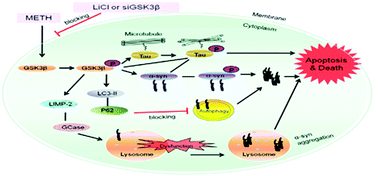Role of GSK3β/α-synuclein axis in methamphetamine-induced neurotoxicity in PC12 cells
Abstract
Methamphetamine (METH) is well-known as a potent psychostimulant of abuse worldwide. METH administration can cause neurotoxicity and neurodegenerative injury, which are similar to the two prevalent neurodegenerative disorders Alzheimer's disease (AD) and Parkinson's disease (PD). Recent results suggested that METH exposure increased the level of α-synuclein (α-syn) that could be a possible cause of neurotoxicity. However, the mechanism of METH-induced neurodegeneration remains unclear. This study was aimed at examining the effects of glycogen synthase kinase3β (GSK3β), α-syn, and tau on METH-induced neurotoxicity. Our results indicated that P-GSK3β (Tyr216), P-Tau (Ser396), α-syn, and P-α-syn (Ser129) levels were increased after METH administration in dose- and time-dependent manners. Upon inhibiting the GSK3β activity with LiCl or GSK3β-siRNA, these protein expressions were significantly decreased. We observed that LiCl protected the cells from METH-caused cytotoxicity by weakening the cell morphological damage and preventing cell apoptosis and death. We also found that P-GSK3β colocalized with P-Tau and α-syn by the immunofluorescence method. Further, METH disrupted the cellular autophagy by upregulation of LC3-II and P62 proteins, and the cellular autophagy was restored by LiCl and GSK3β-siRNA. The expressions of the α-syn-specific degradative enzyme glucocerebrosidase (GCase) with its regulator lysosomal integral membrane protein type-2 (LIMP-2) decreased inversely with the doses of METH treatment. The GCase inhibitor conduritol-β-epoxide (CβE) increased the α-syn levels, and LiCl restored GCase and LIMP-2 expressions disrupted by the METH treatment. In summary, we conclude that GSK3β plays key roles in METH-induced neurotoxicity and neurodegenerative injury by promoting abnormal protein phosphorylation and α-syn accumulation, blocking the autophagy–lysosomal degradation pathway, and finally leading to cell apoptosis and death. GSK3β may be a potential target to prevent METH-induced neurodegeneration.



 Please wait while we load your content...
Please wait while we load your content...